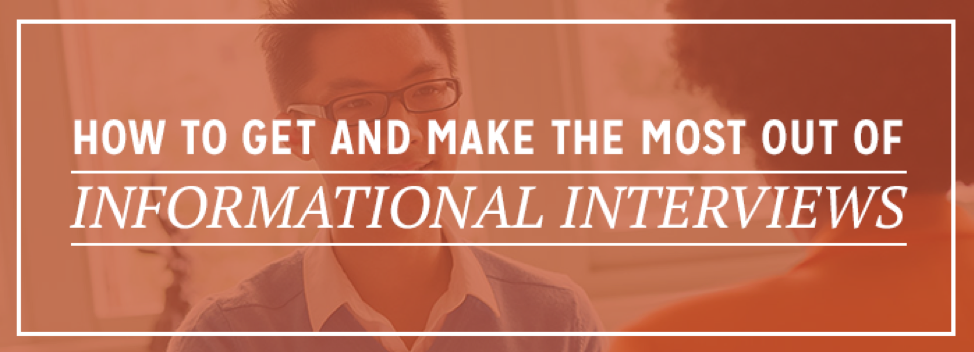How To Get And Make The Most Out Of Informational Interviews
- Date December 14, 2018

When you are on the search for a job, an informational interview can be a valuable tool. Not only can it help you find a position, but it also can give you insider information about the industry you’re pursuing.
Informational interviews, which you set up yourself, give you the chance to ask questions to someone in the industry or company you’re interested in. You can gain valuable insights into industry trends and/or company culture.
Landing an informational interview is great, but be sure you know how to conduct yourself to get the most value out of it. It might just lead to getting your resume in front of the right people at the company of your dreams. Learn how to approach an informational interview and how to make the most of it. Maybe someday an eager job seeker will ask you for one!
How to Get an Informational Interview
Before you can gain anything from an informational interview, you have to get one. The key to getting an informational interview is asking in the right way, without coming across as desperate for a job. The interviewee knows you want a job, but that’s not what this is about. You are simply seeking information in a polite and respectful way. When asking for an interview, do so in a way that makes a “yes” response most likely.
Find the Right People
Julian Knott, Resource Manager at TeamJobs, advises, “The best way to get an informational interview is to start with researching the field you want to get into.” Before you can even ask for an interview, you need to determine the field you’d like to pursue and some companies within it you’d like to work for.

Start with a list of companies that peak your interest, and the title or positions you would like to apply for. Then, find someone in leadership in one of those positions, but not too high up the chain of command to not have time for the interview. “Tell them you’re interested… and let them do the rest,” Knott says. People love talking about themselves to genuinely interested listeners.
Approach in the Right Way
First, approach the person in the right way. Don't call. The person you want to interview is likely busy, and a phone call that interrupts their day is not welcome. Instead, send an email. You can also connect through LinkedIn. This approach gives the recipient the ability to answer at their convenience in his or her own way. Make sure that your email is free from grammatical errors and sent from a professional address. Proofread it at least twice to make a good first impression.
Ask in the Right Way
The way in which you ask for the interview will improve your chances of a positive response. If you can frame your request as asking for help, such as saying "I was hoping you could help me," you will get a better response. Then, say something like, "I would love to take you to lunch or coffee so I can learn more about what it is like to work for your company and your industry." Finally, have a hook. Tell why you want to meet with that person specifically. Whether the hook is the connection you share or the admiration you have for him as a professional, show it.
Don't Indicate You Need a Job
Finally, make sure you do nothing to indicate you are looking for a job from that person. The individual likely knows you are interested but don't send a resume or say that you need a job. Only offer this information if it is asked for.

How to Get the Most out of Your Informational Interview
Congratulations! You landed an informational interview with an interesting professional. Now what? This is a great opportunity, so don’t go into it blind. Take time to prepare yourself for the interview. Informational interview tend to be short, so you need to ensure that you are getting the most out of them.
Be Prepared
“Like anything, preparation is key,” says David McGowan, director at DNA Recruit. “[You] should illustrate genuine understanding for the industry or potential work-place [you] are interviewing.” Make sure you show up prepared. You need a tight, well-crafted personal story about who you are and why you wanted to know more about the company.
You also need a list of questions about the company, as well as questions regarding the department or position the person works in. Be sure to get up to date about the company’s latest accomplishments or other noteworthy events. Research any industry-related news or trends. Additionally, have a way to take notes so you seem prepared and interested in what they have to say.
Add Value to the Conversation
Whether it's buying a cup of coffee or lunch or offering a tip that the company can use, you need to provide something of value early in the interview. You might even be able to use a connection to give a favor to the interviewee. At the very least, convince the interviewee that you appreciate their time.
“To make a lasting impression,” Knott of TeamJobs suggests, “it is important to listen, look the part (dress appropriately), be professional, and thank them for their time.” Remember, someone who is doing an informational interview is doing you a favor, so you need to hold your own in the conversation too. Knott advises to use the 80/20 rule: listen 80% of the time talk for 20% of the time.
Question Well
Your interview is about the other person, not you, so use open-ended questions to keep your interviewee talking. Use directed, efficient questions with open responses, like:
- What inspires you about working for the company?
- What particular skills can help in this field?
- What makes your company different from its competition?
- What was your biggest surprise about this industry?
Aaron Straughan of West Coast Careers advices, “Don’t just ask generic questions for the sake of asking questions. Research the company and industry extensively, as well as the interviewer themselves, then construct questions that go past the surface-level and build on what you’ve already learned.”
Intelligent questions and well-informed interest can really set you apart. Straughan agrees, “By asking insightful questions that you genuinely care about you will come across as more engaging and make a stronger impression.”
Be Enthusiastic
Above all, you need enthusiasm. You need to show that you are excited about the industry and the company. What would your interviewee think if you asked mediocre questions and looked bored the whole time? Look alive! Remember why you are doing this in the first place. That enthusiasm is going to show all throughout the interview.
Recruiting agency director McGowan confirms, “Show passion for the industry [you] are discussing and think about strong, tangible reasons why [you] want to work in this area, either now or in the future.”
Rock Your Informational Interview
Informational interviews provide you the chance to learn more about an industry or company where you feel you would be a good fit. They provide you an opportunity to make industry contacts and, potentially, find out about openings.
While the primary goal is not to land a job, if the interview is handled well, that can be an eventual outcome. Learn how to rock your informational interview, and you will find that they are a great way to jumpstart a successful and fulfilling career.
You may also like

Homestay in China: Live, Learn, and Experience Chinese Culture Firsthand

